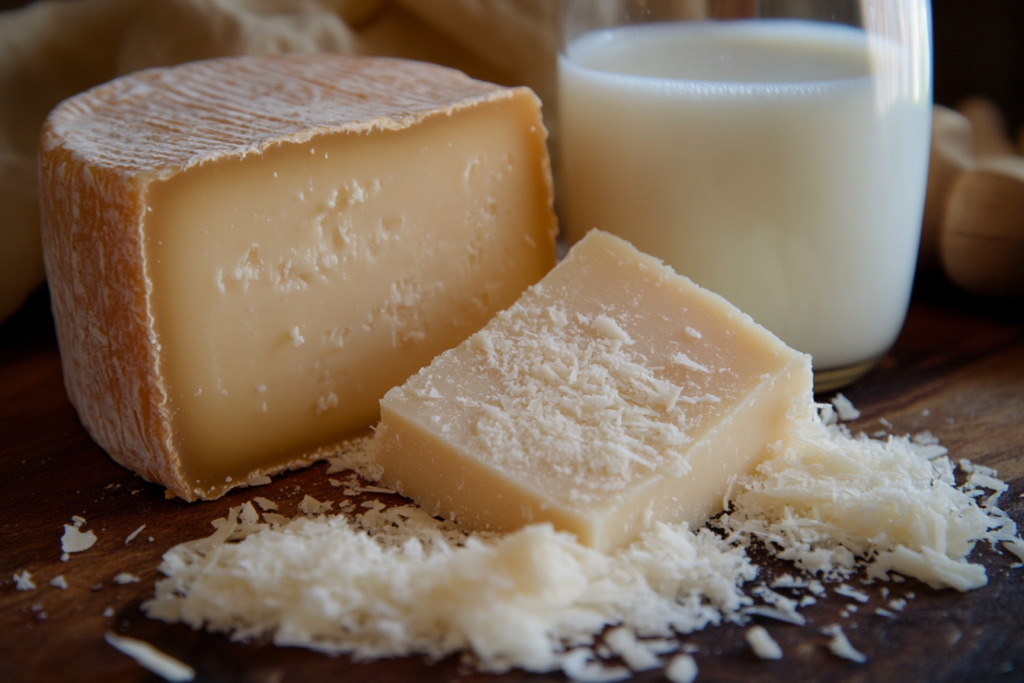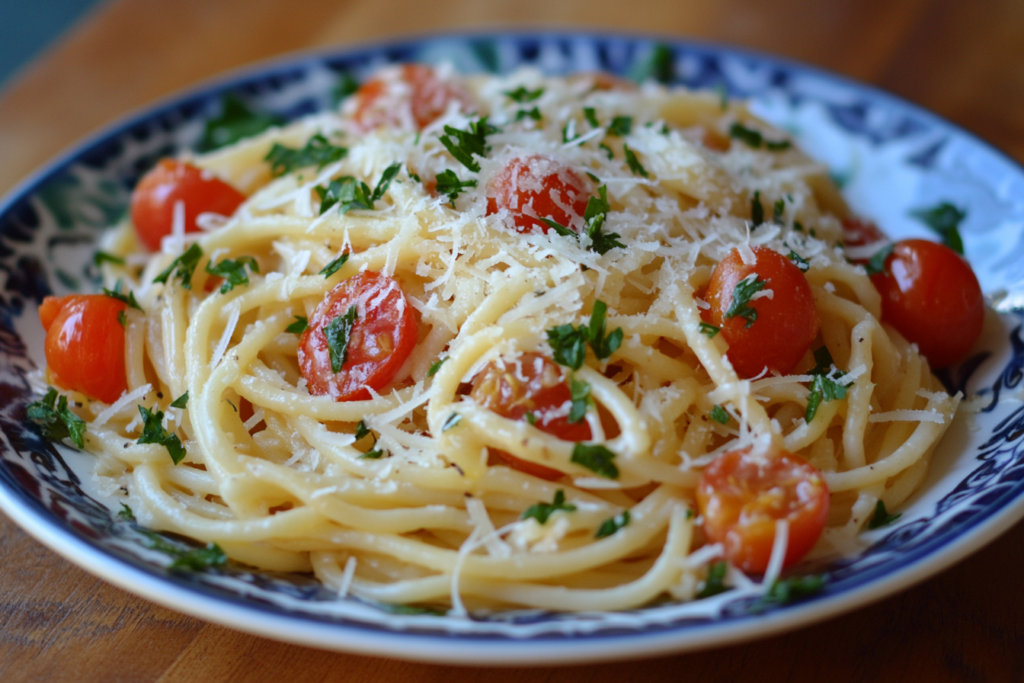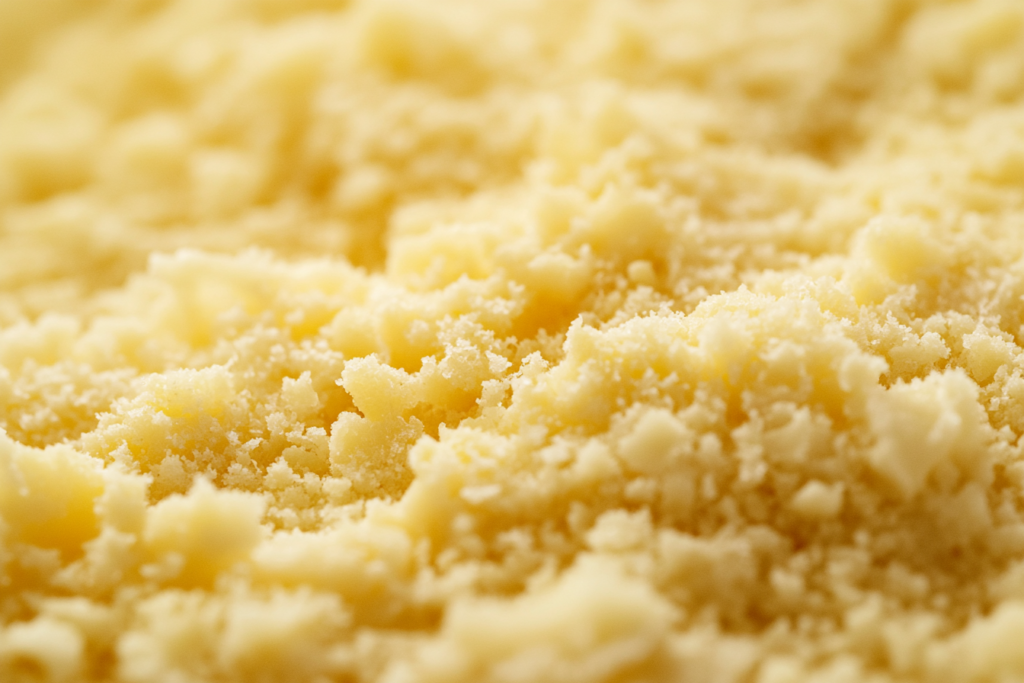Understanding Parmesan Cheese
Definition and Origin
Parmesan cheese, or Parmigiano-Reggiano, is a hard Italian cheese revered for its sharp taste and flexibility. Is Parmesan cheese healthy? This is a question many health-conscious individuals ask when including this beloved cheese into their diets. Originating from specific regions in Italy, including Parma, Reggio Emilia, and Modena, Parmesan is crafted using traditional methods. Its Protected Designation of Origin (PDO) status ensures authenticity. What makes Parmigiano-Reggiano unique is its complex flavor, aged production process, and rich heritage.
Production Process
Making Parmesan cheese is a tradition passed down through generations. Fresh cow’s milk is mixed with rennet and whey, which helps form curds. These curds are pressed, salted, and aged for 12 to 36 months—or even longer—giving Parmesan its sharp, nutty flavor. The aging process not only improves its taste but also makes it easier to digest and gives it a better texture.
As it ages, Parmesan goes through a fermentation process that boosts its nutritional value. This makes it rich in protein and calcium while keeping its lactose levels very low.
Types of Parmesan Cheese
Parmigiano-Reggiano is considered the best, but there are other types of Parmesan available. These may not follow strict PDO rules but still offer similar flavors. Options like grated Parmesan, pre-shredded versions, and aged varieties suit different tastes. However, keep in mind that the quality, authenticity, and nutritional value can vary a lot between these types

Nutritional Profile of Parmesan Cheese
Nutritional Composition
Parmesan cheese is loved not only for its flavor but also for its nutrition. A single serving is full of important nutrients, making it a powerful addition to meals. From protein and fats to essential vitamins and minerals, this cheese offers much more than just great taste. Let’s take a closer look at what makes Parmesan such a nutritious choice.
Macronutrients
Parmesan cheese is rich in macronutrients, the building blocks of any diet. A typical one-ounce serving contains nearly:
- Protein: Around 10 grams, which is a substantial contribution to daily protein needs.
- Fat: Parmesan provides 7 grams of fat, with a mix of saturated and unsaturated fats that deliver energy.
- Carbohydrates: This cheese is almost carb-free, making it ideal for low-carb or keto diets.
The high protein content, in particular, supports muscle maintenance, repair, and overall growth. Moreover, its fat profile adds flavor to meals while supplying essential fatty acids.
Vitamins and Minerals
Parmesan cheese is brimming with micronutrients crucial for overall health. It’s a stellar source of calcium, vital for bone strength, and phosphorus, which complements calcium’s function. Additionally, it offers:
- Vitamin A: Supports vision and immune health.
- Vitamin B12: Crucial for red blood cell formation and neurological function.
- Magnesium and Zinc: These help in various enzymatic reactions and boost immune defense.
The combination of these vitamins and minerals makes Parmesan a nutritious food, perfect for enhancing daily dietary needs.
Caloric Content
While Parmesan has a lot of calories, portion control is important. A one-ounce serving has about 110 calories. Its high calorie count comes from its fat and protein, which also make it very filling. This means you can enjoy smaller amounts without losing flavor or feeling unsatisfied. Finding a balance is key to getting the benefits without overdoing it.
Health Benefits of Parmesan Cheese
Bone Health
Parmesan cheese plays a significant role in promoting bone health, thanks to its rich calcium and phosphorus content.
High Calcium Content
One ounce of Parmesan cheese provides over 30% of the recommended daily intake of calcium. This mineral is critical for building and maintaining strong bones and teeth. Regular consumption of calcium-rich foods like Parmesan can help prevent brittle bones and fractures.
Role in Osteoporosis Prevention
As people get older, their bones naturally become weaker, raising the risk of osteoporosis. Parmesan cheese is rich in calcium and phosphorus, which help strengthen bones and support repair. Including it in a balanced diet, along with other calcium-rich foods, can help protect against bone problems.

Protein Source
Protein is essential for nearly every bodily function, from muscle repair to enzyme production, and Parmesan cheese delivers high-quality protein in every bite.
High-Quality Protein
Parmesan cheese is packed with complete proteins, meaning it contains all nine essential amino acids the body cannot produce. This makes it an excellent choice for those looking to maintain a balanced diet, especially in low-meat or vegetarian lifestyles.
Benefits for Muscle Maintenance
Consuming sufficient protein is vital for maintaining muscle mass, especially for active individuals or those recovering from injuries. The protein in Parmesan cheese is particularly beneficial for muscle repair and regeneration due to its digestibility and amino acid profile.
Digestibility
Parmesan cheese stands out for its remarkable digestibility, making it a suitable choice even for people with sensitive stomachs.
Low Lactose Levels
One of Parmesan’s standout features is its low lactose content. The aging process breaks down most of the lactose, making it tolerable for those who are lactose intolerant. This feature opens the door for individuals who might otherwise avoid dairy products.
Suitable for Lactose Intolerant Individuals
Parmesan cheese offers all the benefits of dairy—calcium, protein, and flavor—without the discomfort often associated with lactose sensitivity. This makes it a rare find in the world of cheeses, allowing more people to enjoy it as part of a balanced diet.
Potential Health Concerns
Sodium Content
Parmesan cheese, while rich in nutrients, is also high in sodium. This characteristic poses potential health concerns for certain individuals, particularly those with salt-sensitive conditions.
Implications for Hypertension
A single ounce of Parmesan cheese contains nearly 450 milligrams of sodium, which can quickly add up if consumed in large quantities. High sodium intake has been linked to elevated blood pressure, a major risk factor for hypertension and cardiovascular diseases. For those managing hypertension, monitoring sodium consumption, including from hidden sources like cheese, is crucial.
Recommended Consumption Limits
To balance its nutritional benefits with its high sodium content, control is key. Health experts recommend limiting cheese portions to a few ounces per week if sodium sensitivity or heart health is a concern. Pairing Parmesan with low-sodium foods like fresh vegetables can further help mitigate its impact while maintaining flavor.
Saturated Fat Content
Parmesan cheese is a calorie-dense food that contains significant levels of saturated fats, which may raise certain health concerns if overconsumed.
Impact on Cholesterol Levels
Saturated fats, when consumed in excess, are known to elevate LDL (bad) cholesterol levels. Parmesan cheese, while offering healthy fats in small amounts, can become problematic for individuals with cholesterol-related conditions if eaten without mindful portion control.
Heart Disease Risk
There’s some debate about how saturated fats affect heart health, but eating too much is usually not recommended. Parmesan, when eaten in moderation as part of a balanced diet, offers important nutrients without adding much risk to your heart.
Parmesan Cheese in Special Diets
Weight Management
Parmesan cheese might not seem like a typical choice for weight management, but its strong flavor and nutrients can help. When eaten in moderation, it adds taste to meals without adding too many calories, making it easier to stick to your diet goals.

Portion Control Strategies
One of Parmesan cheese’s most notable qualities is its intense, savory flavor. A small amount can deliver a significant value of taste, making it an ideal choice for those aiming to control their calorie intake without sacrificing flavor. Here are some effective portion control strategies:
- Use a Microplane Grater: Grating Parmesan finely creates a light and fluffy texture, allowing you to use less while still covering your dish effectively.
- Measure Your Servings: Stick to a one-ounce serving (about 28 grams), which contains around 110 calories, to ensure you’re not unintentionally overindulging.
- Top, Don’t Mix: Instead of blending Parmesan into your meal, use it as a topping. This ensures each bite delivers flavor without requiring a large quantity.
By employing these strategies, Parmesan becomes an excellent addition to calorie-conscious diets, offering satisfaction with minimal impact on your daily intake.
Incorporating Parmesan in Low-Calorie Meals
Parmesan cheese is a great way to add flavor to low-calorie meals. It makes healthy dishes like vegetables, proteins, and grains more enjoyable and tasty.
Here are a few easy ways to use Parmesan in low-calorie meals:
- Salads: Sprinkle a small amount of grated Parmesan on a green salad with a light dressing for extra flavor without many calories.
- Vegetables: Add Parmesan to roasted veggies like zucchini, cauliflower, or asparagus. Just a little can make a big difference.
- Lean Proteins: Top grilled chicken or fish with a small amount of Parmesan for a delicious, low-calorie meal.
The key is using Parmesan in moderation and pairing it with healthy, low-calorie foods. With smart choices, Parmesan can make meals more enjoyable while helping you stick to your weight goals. Delicious food and healthy eating really can go together.
Gluten-Free Diets
Is Parmesan cheese healthy for individuals following gluten-free diets? Absolutely! Parmesan cheese is a flexible and safe option for those adhering to gluten-free eating habits. Its natural production process ensures that it remains free from gluten, making it a dependable choice for people managing conditions like celiac disease or gluten sensitivity. Let’s dive deeper into its suitability and potential risks to help you make informed dietary decisions.
Suitability for Celiac Disease
For individuals with celiac disease, even trace amounts of gluten can trigger significant health issues. Authentic Parmigiano-Reggiano is naturally gluten-free due to its traditional production process, which involves milk, rennet, and salt—none of which contain gluten. The long aging period, often lasting over a year, further ensures the absence of contaminants.
Parmesan cheese is full of key nutrients like calcium, protein, and phosphorus. These nutrients can help fill the common gaps in gluten-free diets. With its bold and delicious flavor, Parmesan is a perfect addition to gluten-free meals, making them tastier and healthier at the same time.
Cross-Contamination Risks
While real Parmesan cheese is naturally gluten-free, cross-contamination can still be a risk, especially with pre-packaged or grated options. During processing, the tools or places used to shred, pack, or store Parmesan might also handle foods with gluten, which can lead to unwanted contamination.
That’s why it’s important to look for Parmesan cheese labeled “certified gluten-free.” This label means the product was made in dedicated facilities and tested to ensure it doesn’t contain gluten. Here are some easy tips to help reduce the risk of cross-contamination:
- Opt for Whole Wedges: Buying Parmesan in its original wedge form and grating it yourself significantly reduces the risk of contamination.
- Read Labels Carefully: Look for clear gluten-free labeling on pre-packaged or grated Parmesan cheese.
- Verify with Brands: When in doubt, consult the manufacturer’s website or customer service for specific details about gluten-free certification.
By following these tips, you can safely enjoy Parmesan cheese as part of your gluten-free diet, gaining its health benefits without risking your dietary needs.
Frequently Asked Questions (FAQs)
Is Parmesan cheese safe during pregnancy?
Yes, Parmesan cheese is safe to eat during pregnancy. Unlike soft cheeses, which can carry risks of listeria, Parmesan is a hard cheese made from pasteurized milk and aged for a long time. This process makes it hard for harmful bacteria to grow. Parmesan also gives important nutrients like calcium and protein, which are vital for both the mother’s health and the baby’s development. However, pregnant women should always make sure their cheese comes from a trusted source to avoid any risks of contamination.
How does Parmesan compare to other cheeses nutritionally?
Parmesan cheese is a nutritional standout among cheeses. Compared to softer cheeses like mozzarella or cream cheese, Parmesan has more protein, calcium, and other important minerals. It also has less lactose, making it easier to digest for people with lactose sensitivity. While Parmesan has more sodium and calories than lighter options like ricotta, its strong flavor means you can use smaller amounts and still feel satisfied. If you’re looking for a healthy and flavorful cheese, Parmesan is often the best choice.
Can Parmesan cheese cause allergies?
Although it’s uncommon, Parmesan cheese can cause allergies in people who are sensitive to dairy or certain proteins in cheese. A common allergen in Parmesan is casein, a milk protein, which can lead to reactions like mild stomach pain or more serious symptoms such as hives or trouble breathing. People with dairy allergies should completely avoid Parmesan. Interestingly, because Parmesan has very little lactose, it is often easier for people with lactose sensitivity to eat compared to other dairy products.
Conclusion and Final Thoughts on Parmesan Cheese

Is Parmesan cheese healthy? Absolutely! Parmesan cheese is much more than a beloved kitchen staple; it’s a nutritious food that offers both flavor and health benefits. Packed with calcium, protein, and essential vitamins, it supports bone health, muscle maintenance, and even weight management when consumed in control. Its low lactose content makes it a suitable choice for individuals with lactose sensitivity, while its intense flavor ensures that small portions can deliver greatest satisfaction.
Even so, Parmesan does have some disadvantage. Its high levels of sodium and saturated fat can be an issue for people managing high blood pressure or cholesterol. Using small portions and pairing it with healthier, low-sodium foods can help keep your diet balanced.
Parmesan’s flexibility also makes it a great fit for special diets. Whether it’s gluten-free plans or low-calorie meals, this cheese can be added without losing any flavor or nutrition. It’s also a safe and delicious option for pregnant women or anyone looking for a healthy addition to their meals.
In summary, Parmesan cheese can be part of a healthy lifestyle when eaten carefully. By weighing its benefits and risks, you can enjoy this famous cheese without guilt, adding its distinct flavor and nutritional value to your meals.


2 thoughts on “Is Parmesan Cheese Healthy? Nutritional Insights, Benefits, and Risks”